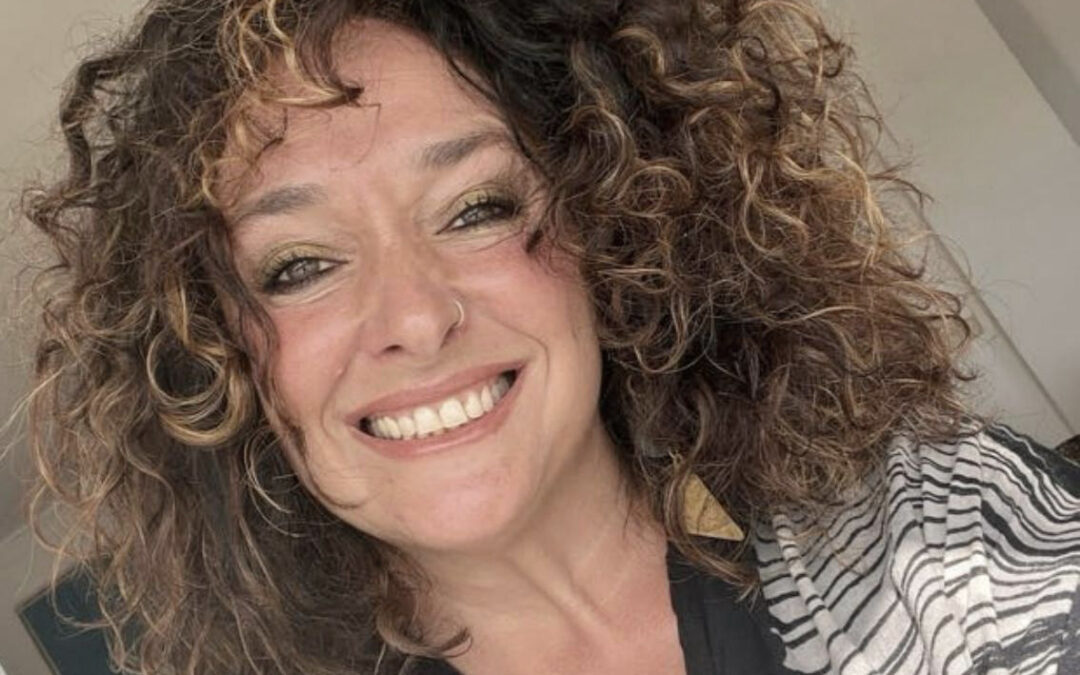Tell us a bit about yourself: who are you, where are you from, and what do you do?
Hi, I’m Monia Antonioli. I was born in a small village near Cremona, in northern Italy. Growing up, that setting always felt too small to me – with music videos and the little I could read in newspapers and magazines, because back then there was no internet – I began to dream of life elsewhere. I wished to live in London, a city where anyone could become who they wanted to be. In my imagination, it was full of possibilities and interesting opportunities, with a diverse population. I also wanted to meet people from other cultures and learn new languages. I’ve always loved talking and connecting with other humans.
At university, I studied Languages and Modern Literature and began traveling to Ireland and England to improve my language skills. I loved those experiences, and as soon as I could, I did Erasmus exchanges in Wales and France, experiences that shaped my personality, deepened my passion for languages, and sowed the seeds of lifelong friendships.
After graduation, I moved to London and worked at Bloomberg, an American financial news company. I stayed in the finance sector for several years… until I returned to my first loves: languages and photography. I took teacher training and earned the diplomas to teach languages, beginning a new career path.
First I moved to Madrid, where I studied photography for a year and learned Spanish while teaching English in several companies. After two years, I realized another dream: volunteering in Kenya, where I taught languages at a primary school on a small island. I ended up staying for a full year. It was an incredible, transformative experience that made me fall even more in love with Africa, a continent I still return to often.
Since then, I have been teaching languages (Italian, English, Spanish, and French), primarily online to professionals and private students in multiple countries. Despite initial apprehensions about online teaching during COVID, it turned out to be a deeply enriching experience, enabling me to connect with students worldwide and forge special relationships that often become friendships. I particularly enjoy supporting expats living in Italy or Spain who want to learn the language… and I love it!
Alongside teaching, I also work independently as a photographer across different countries, capturing portraits, documenting events, and collaborating with diverse organizations. For me, photography is another form of language, and I love creating connections through the camera.
What brought you to Granada for the first time? What do you like most about the city?
I first visited Granada in 2007 during a personal and career crisis. I traveled through Andalusia with my camera to figure out what I wanted to do with my life. In Granada, at the Alhambra, I met Agustín, a photographer working on a documentary about the city. We immediately became friends, and a few months later, I applied to the EFTI photography school in Madrid. Back in London, I quit my bank job and returned to Spain, where I began my professional photography journey at EFTI. Agustín and I have since gradually started collaborating, and we still work together today, despite living in different countries.
I was captivated by Granada from the beginning. Years later, a student I’d been collaborating with, from London invited me to join an Erasmus+ project based in Granada. My main role was sourcing companies to host graduates for internships. That led to a more stable return in 2023.
What I love most about Granada is its beauty, cultural fusion visible everywhere, the Arab influence, vibrant culture, and amazing food. Its small size allowed me to explore it fully from the start, wandering its streets, discovering special corners, and simply sitting and watching life go by… pure soul-pleasure. I continued teaching online while based there, and some students even visited, which was delightful. I’ve also found many wonderful friends in Granada, which makes me truly happy!
What do you enjoy most about teaching? Is there any particular theme or aspect of language that fascinates you?
As I’ve mentioned, I love connecting with people, learning about their stories, witnessing their growth and achievements, and teaching enables all of that. Knowing motivated people who are excited to learn a language already brings me joy. The most fascinating aspect of teaching is discovering each individual’s distinct learning style. Teaching adults is a lesson in humility learning a new language as an adult is challenging and requires vulnerability.
I’m especially captivated by the way learning a language opens up an understanding of another culture. Experiencing new customs, ways of living, and interacting reflected in language and expression is simply fascinating. I always tell my students: a language is the living expression of culture. Learning it reveals roots, social subtleties, and cultural nuances that shaped the language itself. Over the years, teaching mostly adults has allowed me to form bonds beyond teacher-student relationships; many have become lasting friendships.
Do you teach a specific age group, profession, or type of student?
My students are very diverse. I’ve literally taught under a baobab tree in Kenya without resources… and today most lessons are through a screen, connecting people across continents. Most students are professionals from varied sectors—luxury, banking, construction, renewable energy. Some are retirees, others contacted me about teaching their children or exam preparation.
In recent years, I’ve lived between Kenya, Andalusia, and southern Italy. In southern Spain and Italy, I’ve been teaching many “expats”, people from northern Europe who moved south. It’s inspiring to see individuals of all ages with successful careers willing to challenge themselves by learning a new language to better integrate into their host country.
What types of language services do you offer?
Beyond personalized teaching shaped around students’ interests and hobbies, I prepare students for exams and offer translation and interpreting services. I’ve worked as an interpreter at photography conferences and as a guide during photographic travel trips.
You have a collaboration with ANDA. Tell us more about it. What benefits do you offer ANDA members?
I was fortunate to get to know ANDA while researching companies to host Erasmus+ graduates in Granada. I believe it was the first organization I contacted. From my initial conversation with Victoria (the founder), I felt her inclusive, peaceful energy. ANDA is a warm, stylish, eco-conscious workspace in Granada that resonates with positive energy—an ideal place for digital nomads or remote workers. I offer ANDA members a discount and, as with all students, I’m committed to supporting them inside and beyond class time.
How can people get in touch with you?
You can contact me via WhatsApp—I’d be happy to answer any questions:
+44 (0) 7814 575 425
Website: thebaobablanguagehub.com
Portfolio: moniaantonioli.com
How do you maintain student motivation—especially in online classes? What advantages do you see in online teaching?
When I began teaching online during Covid, it felt strange at first, but I’ve always preferred to see the glass half full. I soon adapted and embraced the positives: Time efficiency,no commuting means more time for learning. Freedom to connect globally, which enriches exchanges beyond language. Interactive tools, screen sharing allows active participation in exercises. Eco-benefits, no travel or paper charts reduces environmental impact. Many adults aren’t tech-savvy at first (I wasn’t!), but with practice they incorporate learning tools into their daily routines. To keep students engaged, it’s essential to learn about their interests, motivations, and preferred learning styles.
I offer tailored approaches: some students prefer measurable progress via exercises, others like conversational correction, some enjoy challenges like reading books or articles. Many are motivated by visible progress while preparing for exams or personal growth. Others learn for fun and challenge, and I center lessons around hobbies and personal interests.
Another key is providing constructive feedback—viewing errors as learning opportunities and offering positive encouragement. I remember a French teacher in high school who told me to give up languages—it wasn’t for me. I’m glad I didn’t listen. That experience motivates me to maintain a supportive, uplifting approach so that all my students feel encouraged and empowered.
Do you adapt your teaching based on a student’s native language?
Not always. Rarely do I teach someone whose native language I don’t speak. Most students are native speakers of English, French, Italian, Spanish, or Portuguese—and knowing these languages helps me anticipate common errors and explain their reasons. This insight is very helpful.
Do you offer group lessons or only individual ones? What are the pros and cons?
I offer both, each format has its strengths: Individual lessons are ideal for executives or people who prefer privacy. Whole attention is on one student—perfect for personal topics and confidential discussions. Group lessons (usually 2–3 people) suit colleagues or friends learning together. They foster connection, active participation, and a fun learning atmosphere. Students motivate each other, learn from each other, and there’s a healthy sense of friendly competition. Respect and discretion for each participant are essential in either format.
What are your future plans?
Great question! 😃 As you can see, I’m curious, creative, and open to change if it brings happiness. So my plans tend to evolve.
Professionally, I plan to continue teaching language online and help more people enjoy becoming linguistically confident in another country. Photography remains a language for me too. I’ll keep creating connections and opportunities wherever I am.
This online teaching model really excites me. I love meeting people from different places, and technology helps build meaningful connections. Photography work, of course, must be in person, so I’m ready to travel. A laptop and good Wi‑Fi mean I can bring learning to students anywhere.
What’s wonderful is that some students end up visiting me where I’m based. For example, when I lived in Kenya during Covid and travel became possible, students came to meet me, it was deeply inspiring to share such different experiences. It hasn’t been easy to build the life I wanted, nothing is perfect but I’ve learned to go with the flow and adapt to change with a different attitude. I believe we each have a purpose, and many people say mine is to inspire others to pursue their desires. Through language learning, we break mental barriers and open doors. Through photography, we learn to see differently, not just the world around us, but ourselves and begin to see possibilities where once there were limits.
Ultimately, I believe it’s vital for people to express, communicate, and inspire one another constantly. Only those who open themselves to that can create a positive ripple effect and spark the change they wish to see in the world.

